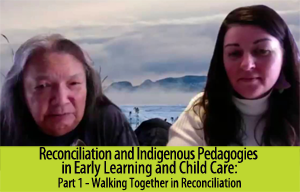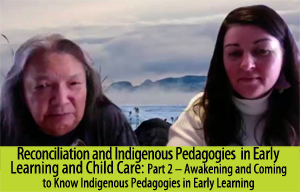Online Learning Centre
Webinar Series – Truth and Reconciliation Commission of Canada: Calls to Action

Reconciliation and Indigenous Pedagogies in Early Learning and Child Care: Part 1 – Walking Together in Reconciliation
Webinar length: 60 minutes
Publish Date: February 2021
CMAS is pleased to present an opportunity for CNC staff to learn about Canada’s Indigenous peoples’ history, knowledge and pedagogies while engaging in reconciliation. For this three-part webinar series, Elder Brenda Mason and Lori Huston, RECE, will join us to share Indigenous knowledge and stories from their perspectives, teachings and lived experiences.
In part 1 of this three-part series, we discuss the Truth and Reconciliation Commission of Canada: Calls to Action, including two recommendations that are specifically related to the early learning sector: new Indigenous Education legislation and culturally appropriate Indigenous programs. This webinar and associated article support a deepening of our understanding of what it means to honour the knowledge and skills Indigenous children and families.

Reconciliation and Indigenous Pedagogies in Early Learning and Child Care: Part 2 – Awakening and Coming to Know Indigenous Pedagogies in Early Learning
Webinar length: 63 minutes
Publish Date: February 2021
Indigenous knowledge is a knowledge system that is different from Eurocentric knowledge – it is closely tied to space. In part two of this webinar series and associated article, Elder Brenda Mason and Lori Huston, RECE we share teaching and learning processes that are holistic and narrative-based.
CMAS Tutorial: What is the Difference Between Emergent Curriculum and Child-Centred Programming?
The terms “child-centred programming” and “emergent curriculum” are often used interchangeably. But have you ever found yourself wondering what emergent curriculum means? Or maybe you wonder how a child-centred program is different from an emergent curriculum? Our newest tutorial provides a quick overview of child-centred programming and emergent curriculum, help in understanding your role as a facilitator of children’s learning, and some tips for expanding on children’s interests. At the end of the tutorial, you’ll also find resources, references, a Facilitator Guide and Questions for Personal Reflection/Group Discussion so that you can easily facilitate your own team training.
A Look Around the World – Winter Celebrations
The winter holiday season is a special time of year, especially for children. How we celebrate this year may look different, but the spirit will be the same! As early childhood education professionals, we strive to make this time of year special for the children in our lives and welcome the opportunity to celebrate diversity and promote inclusion. With the winter months upon us, we look around the world to explore 10 different winter celebrations. Learning about the celebrations of other cultures can bring us closer together and make us stronger.
Webinar: Building Holiday Diversity
In this HiMama Helps Webinar, participants will take a look at diversity and inclusion around the holiday season, explore tips, and ways to be inclusive in early childhood programs while celebrating different holidays.
CMAS Webinar: Resolving Conflict at Work with Karen Minty
Do you know how different personality styles behave under stress? How does your team resolve conflict under stressful situations? Karen Minty explains the basic needs of each personality style, and appropriate strategies to deal with difficult behaviour to quickly diffuse situations and prevent further conflict in this Resolving Conflict at Work webinar.
New Special Needs Tutorial Series: How to Write an IPP
Have you ever wondered about how an Individual Program Plan (IPP) works? Do you know how to write long- and short-term goals? The first tutorial in the two-part special needs series provides a step-by-step guide to writing an IPP, and an opportunity for CNC staff to learn about the different parts of an IPP, why they’re important, and how they work together to support a child. The second tutorial provides a step-by-step guide to writing an IPP – including long- and short-term goals that really support their programming and provide a clear direction for helping a child and family! Resources, references, a facilitator guide, and group discussion questions are also available for each tutorial in the learning centre.
